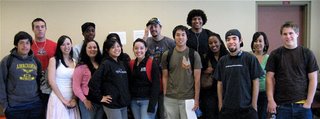I think the appeals court rightly decided that Apple's right to know who leaked product information ends where the First Amendment begins. The appeals court essentially said online and print journalists are equally protected by the First Amendment to the U.S. Constitution, and that Web sites are covered by California's shield law protecting the confidentiality of journalists' sources.
The Electronic Frontier Foundation called it a "huge win." EFF Staff Attorney Kurt Opsahl, who argued the case before the appeals court last month, said the decision was "a victory for the rights of journalists, whether online or offline, and for the public at large."
Blogger Pamela Jones of Groklaw.net, which filed an amicus brief in the case, described it as "a *huge* win!" She added, "Now journalists can feel safe knowing that they can protect their sources’ identity no matter in which medium they choose to disseminate news."
Here's an excerpt from the opinion:
"We can think of no workable test or principle that would distinguish 'legitimate' from 'illegitimate' news. Any attempt by courts to draw such a distinction would imperil a fundamental purpose of the First Amendment" which guarantees freedom of the press."
Link to PDF of the full decision in this case: http://www.eff.org/Censorship/Apple_v_Does/H028579.pdf
Now for the bad news...
The Bush administration appears to be misusing the Patriot Act to track the phone calls of journalists who are reporting on its domestic spying program and allegations of secret prisons in Europe, including reporters at ABC News, The New York Times, and The Washington Post.
Under the Patriot Act, the administration can use a National Security Letter (NSL) to get phone records without having to go through a judge or notify the people involved...which means journalists won't find out about it until it's too late to get an injunction to protect their sources. No more Judith Millers. Why bother to threaten reporters with jail time for not revealing their sources when you can just secretly tap their phones or get their phone records and find out who they've been calling...and who's been calling them.
Remember when we were told domestic spying was just about tracking terrorists?
Writing in his The Online Beat blog, John Nichols of The Nation said, "If the administration has begun reviewing the telephone calls of reporters not to catch lawbreakers but to prevent revelations of its own lawlessness, then this White House has strayed onto dangerous political turf."
Pointing to President Nixon's enemies list, which included a number of well-known journalists, Nichols noted that "the Bush-Cheney administration would not be the first to go after journalists in order to protect itself from challenges to its authority."
To see what news reporters are saying about the situation, check out Joe Strupp's article in Editor & Publisher.